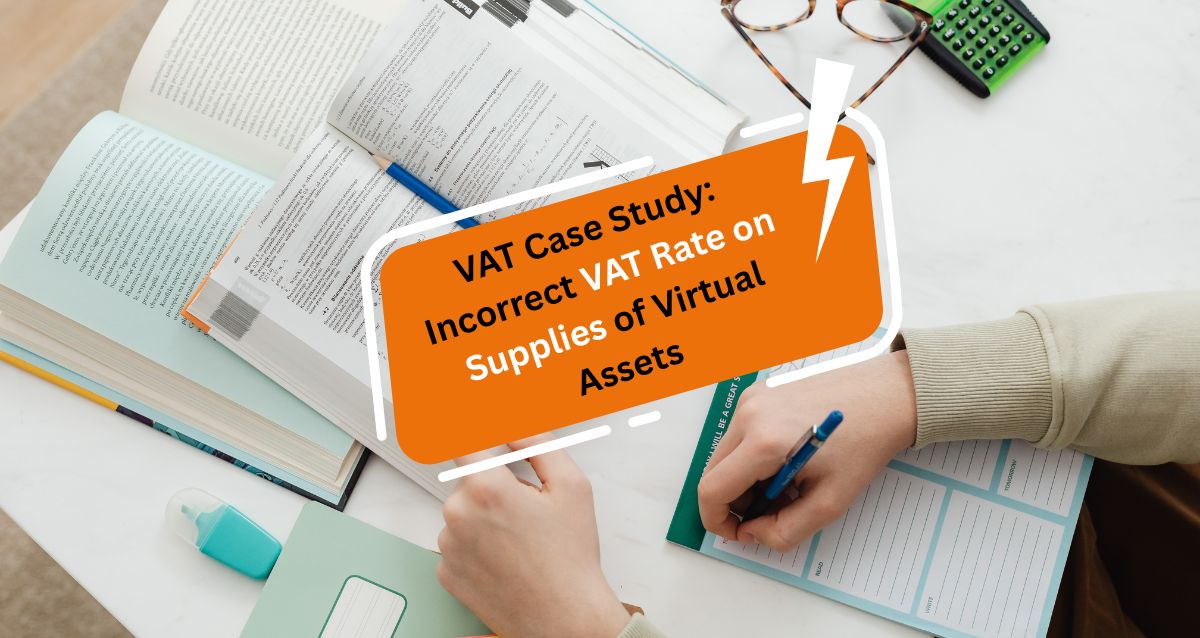Case Study: Virtual Assets and Incorrect VAT Charges
Disclaimer: The company names and details mentioned in this case study are fictional and have been created solely for illustrative and educational purposes. Any resemblance to real entities is purely coincidental.
Due to recent developments in the country landscape, the UAE has become the favourite hub for businesses engaged in virtual assets, particularly cryptocurrencies, NFTs and services related to tokens. At this phase, it is crucial for businesses to understand the VAT implications while dealing with Virtual Assets and related services. The amended VAT Executive Regulations issued in March 2025 (Cabinet Decision No. 100 of 2024) explain the applicability of VAT for Virtual Assets. This case study explains the impact of a company that applied the VAT incorrectly on their business transactions related to virtual assets and the consequences.
Background of the Company
➤ Name: CryptoVantage Digital Markets FZCO
➤ Free Zone: Dubai Multi Commodities Centre (DMCC)
➤ Business Model:
- Peer-to-peer (P2P) cryptocurrency trading
- Token development and issuance services
- Smart contract deployment for digital assets
➤ Annual Revenue: AED 22 million
➤ VAT Registration: Effective since January 2022
CryptoVantage engaged in the business of operating a digital platform where users can trade crypto assets and buy tokens for investment and utility purposes. Based on the assumption company classified its operations as digital services, which are generally subject to standard-rated VAT under UAE VAT regulations and charged 5% VAT on each transaction.
Objective
The company's finance team wanted to:
- Remain compliant with UAE VAT rules as a fast-growing company in the web3 and crypto space to avoid the penalties for incorrect tax practices
- Avoid disputes with customers who are well aware of crypto transactions and regarding VAT charges, and to maintain good customer relationships.
- Make sure that VAT is accurately classified for all token-related income to avoid errors in reporting.
Legal Reference: Article 42 (Amended March 2025)
Article 42 of the amended UAE VAT Executive Regulations introduced important clarifications:
- Supplies involving financial instruments such as investment tokens or cryptocurrencies used as payment methods may qualify as exempt from VAT
- Services linked to the issuance or trading of these exempt financial instruments may also be exempt
- On the other hand, utility tokens, NFTs providing access to digital experiences, or tokens used to redeem physical goods, are subject to 5% VAT
FTA guidance further indicates that classification depends on the actual function of the asset, not just its name or technological format.
What Went Wrong?
The errors committed by CryptoVantage in its transactions were,
- Applied 5% VAT on all services, including those relating to the issuance and sale of payment tokens and investment tokens. By treating these exempt supplies as taxable, CryptoVanatge collected tax incorrectly and reported it with FTA
- Failed to segregate exempt financial services from taxable digital goods and utility services. Due to a lack of segregation, all the transactions were treated in the same way, leading to incorrect classification of financial services and inaccurate tax reporting.
- Tax invoices are wrongly issued by including VAT on exempt transactions. As a result, the reported inflated output VAT in VAT returns
As a result, the company over-collected VAT, breaching both invoicing and tax calculation rules under the UAE VAT Law.
FTA Review and Findings
During a routine FTA audit:
- It was identified that CryptoVantage generated approximately AED 5 million of revenue related to exempt activities (cryptocurrency trading facilitation and investment token structuring)
- CryptoVantage had incorrectly charged VAT in their invoices for exempt supplies and collected a total of AED 250,000 in VAT from the clients.
- FTA has issued a notice outlining the steps to follow for rectifying the error, which includes:
- Issuance of credit notes to affected clients for the VAT wrongly charged, and notify the clients that VAT has been reversed
- Submit a Voluntary Disclosure to FTA for the periods during which VAT was incorrectly charged to clients and reported.
- The upcoming tax returns must be reported correctly, and ensure that exempt services are not mistakenly treated as taxable.
Financial and Reputational Impact
- VAT Overpaid: CryptoVantage had overpaid AED 250,000 as VAT
- Client Refund Requests: Wrong classification of VAT and collecting VAT from clients incorrectly, leading to strained relationships
- Cost of Compliance Correction: Correction of compliance errors requires significant Time, advisory fees, and possible penalties from the authority if disclosures were delayed
- Market Perception Risk: These compliance errors will result the financial and operational disruption and the company's reputation in the market, particularly among token investors and exchange partners
Key Lessons Learned
1. All virtual assets are not treated equally under VAT law
VAT treatment for virtual assets will vary according to the transactions. Crypto-as-currency and financial tokens may be exempt, while utility tokens are taxable. Businesses must be aware of these distinctions for proper VAT compliance.
2. Functionality determines VAT treatment
It is critical to evaluate what the token or asset does in practice to apply the correct VAT rules because the VAT treatment of a token or asset is determined by its functionality.
3. Misclassification results in over-taxation and reputational harm
Businesses in this sector must adopt precision in pricing, invoicing, and tax reporting to avoid incorrect classification of virtual assets, overpaying of VAT, client dissatisfaction and reputational damage.
4. Monitoring digital sectors more closely by the authority
Companies should be more aware of their VAT compliance, as FTA recently initiated the monitoring of digital sectors like digital asset firms more closely.
Corrective Actions Taken
CryptoVantage undertook the following steps:
- Hired an FTA-approved Tax Agency to review and classify each service line correctly based on updated law
- Reengineered the billing system so that VAT will apply automatically only to the transactions which required by law.
- Issued credit notes for affected clients against incorrect VAT charge in tax invoice, and submitted a Voluntary Disclosure to the authority to correct the returns submitted to the authority.
- Trained internal staff on virtual asset VAT treatment to handle the transactions related to virtual assets, referring to Article 42 and FTA Public Clarifications to ensure proper compliance.
Ongoing Compliance Strategy
CryptoVantage now:
- Maintains detailed records of token functionalities and classification rationale
- Reviews contracts, whitepapers, and use-cases for each token sold
- Conducts quarterly compliance checks against FTA guidance
- Request clarification from the FTA on borderline cases via official channels
How Flyingcolour Tax Consultant Can Help
If you operate in the virtual asset, tokenisation, or Web3 space, our VAT experts can help you:
- Classify your digital offerings under UAE VAT law
- Draft compliant tax invoices and contracts
- Prepare voluntary disclosures and refund requests
- Stay updated with fast-evolving tax guidance for crypto assets
To learn more about VAT Case Study: Incorrect VAT Rate on Supplies of Virtual Assets, book a free consultation with one of the Flyingcolour team advisors.
Disclaimer: The information provided in this blog is based on our understanding of current tax laws and regulations. It is intended for general informational purposes only and does not constitute professional tax advice, consultation, or representation. The author and publisher are not responsible for any errors or omissions, or for any actions taken based on the information contained in this blog.




